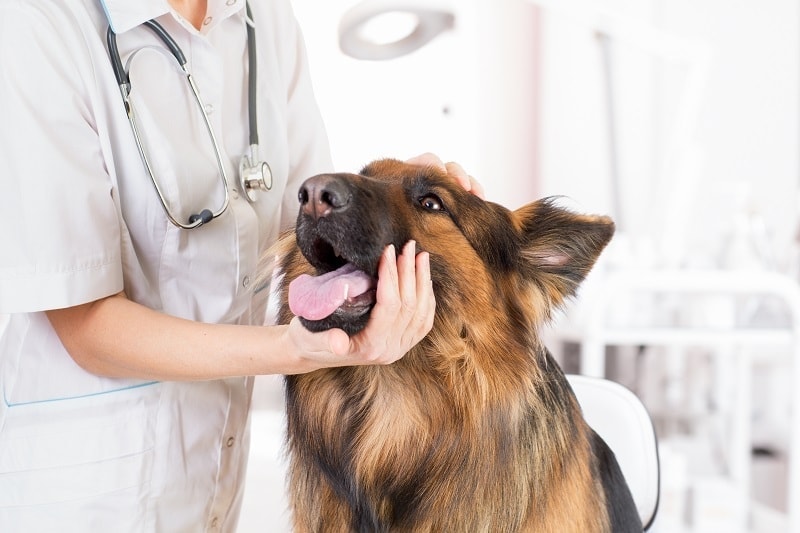How Much Does Dog Allergy Testing Cost? 2024 Pricing Guide

Updated on

Click to Skip Ahead
If you’ve ever had allergies, you know how distressing it is. Unfortunately, they’re not just a human problem. Dogs can get allergies too, and if you suspect your dog is having an allergic reaction, you can get testing to find out what the culprit is.
Before you head to the vet, here’s a quick rundown on allergy testing and treatment options to keep you informed.
Why Get Allergy Testing?
Allergies are common in dogs, but allergy testing isn’t necessarily routine. If your dog appears to be happy and healthy, with no signs of allergic reactions, allergy tests are considered optional. However, if your dog shows signs of food or environmental allergies, a test can help you narrow down what is causing the symptoms and help you find the best path forward when it comes to treatment.

Symptoms of Allergies
- Itchiness
- Hives
- Swelling of face or other body parts
- Red, inflamed skin
- Diarrhea
- Vomiting
- Sneezing
- Chronic Ear Infections
- Runny or painful eyes
- Constant licking
How Much Does Allergy Testing Cost?
Allergy tests have multiple different options of allergens to test for and that can cause the price to vary widely. Different tests have different costs, and there are other factors that can drive the price up or down in your area.
In addition, like all kinds of veterinary care, vet costs are usually higher in areas with more expensive costs of living so that your vet can cover all the costs of salaries and building expenses. That being said, your vet will be able to give you an estimate of the cost for the type of test your dog needs. Here’s a quick rundown of test types.

Vet Allergy Tests
The surest way to learn about your dog’s allergies is by talking to your vet about getting allergy testing done. Most vets will offer either skin or blood tests to analyze allergies. Blood tests involve taking a blood sample and sending it away to specialist laboratories that search for allergy-specific antibodies, while skin tests involve putting small amounts of allergens under your dog’s skin and watching for a reaction, these are usually offered by veterinary dermatologists.
Skin tests are considered the most accurate and give results in about 20 minutes, but not all vets will have access to skin testing. Blood tests are slower and might be slightly more expensive. Reported prices are around $200–$250 for a skin test and $200–$300 for a blood test for allergies but this should be confirmed by your veterinary clinic as prices vary greatly.
Additional Costs to Anticipate
One of the most common costs of allergy treatment is allergy medicine. These medicines can vary widely in price, from only a few dollars a bottle to much more, depending on brand, specific medication, and dose required. However, since allergy medicines are generally given throughout your dog’s life, the cost over time should be considered. You generally need a prescription for allergy medication.
Another common cost is allergy-safe food. Depending on what foods your dog is allergic to, you might need to buy specialty foods that will avoid triggering your dog’s allergies. Like regular dog food, there’s a wide range of prices depending on food type and brand, but most allergy-safe food isn’t much more than a comparable non-allergy food. For some dogs, it’s as simple as avoiding specific flavors of dog food, while others need specialized formulas designed for allergies and sensitive stomachs.

Food Allergies vs Intolerances
When it comes to food, the market is flooded with “allergy-friendly” dog food, but true food allergies are rare. Food allergies generally have a mix of classic allergic symptoms that can spread over the body, including swelling, skin problems, and hives.
More common than food allergies are food intolerances. These are common foods that your dog’s stomach struggles to handle. Your dog might turn his nose up at certain foods and have gastrointestinal symptoms like diarrhea or constipation after eating them. Food intolerances generally won’t show up on allergy testing and are best discovered through the process of elimination instead.
Does Pet Insurance Cover Allergy Testing?
Most pet insurance covers some level of allergy testing and medication if symptoms develop after you sign your pet up for insurance. Many insurance companies don’t provide coverage for pre-existing conditions, so if you wait until after your dog has symptoms before getting insurance it’s possible that your coverage will be denied. Even if your insurance doesn’t cover allergy testing, it might cover prescription medications including allergy meds.
It’s important to read your contract carefully to learn what your insurance covers in regard to allergies. Pet insurance doesn’t usually cover home allergy tests.

How to Treat Allergies in Dogs
There are two main types of allergies in dogs, food allergies and environmental allergies. As the name suggests, dogs with food allergies have an allergic reaction when they eat certain foods. Common allergens are proteins and include chicken, dairy, soy, wheat, and eggs, but there are many other possible allergies. With food allergies, the best treatment is to adjust your dog’s diet to avoid these allergens. There are many foods on the market for limited diets and foods available that avoid common allergens.
Environmental allergies are a different matter. These allergies can be to anything in your dog’s environment, like dust, mold, fleas, or pollen. Although you can make some environmental changes to help your dog, most environmental allergies aren’t completely avoidable. Instead, allergy medications can be administered at your vet’s discretion to help your dog deal with allergies.
Conclusion
Overall, allergy testing is a great way to care for your dog’s health and make sure that nothing is wrong. There are several different options for allergy testing that can make it more affordable. Whatever type of testing you choose, be prepared to treat any allergies found through lifestyle changes and medication.
Related Reads:
- How Much Does a Dog Cost?
-
What Are Allergy Detection Service Dogs? Odor Detection, Training & FAQ
- 3 Most Common Cat Allergies &Their Signs: Vet-Reviewed Facts
Featured Image Credit: In Green, Shutterstock















